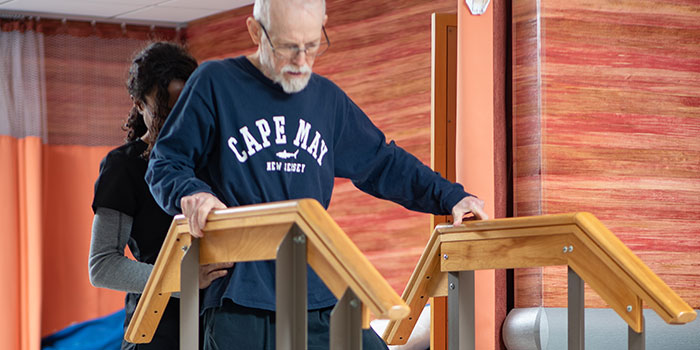1
2
3
4

If you or someone you know has recently been admitted to the hospital for a heart health issue, you may be asking, “What comes next?” Families and friends want to make sure their loved ones will be OK, and you might be wondering if you’re ready to go home. Cardiac rehabilitation can help ease the transition and reduce your chances of hospital readmission.
Cardiac rehabilitation is a medically supervised program for people who have had a heart attack, heart valve surgery, heart failure, coronary artery bypass grafting, or percutaneous coronary intervention. Standard cardiac rehab programs that are covered by most insurance plans include 36 sessions over 12 weeks and are supervised by a team of healthcare professionals.
While every program is different, many include in-house exercise training, education on heart-healthy living, and/or counseling. You will often learn about lifestyle changes that will reduce your heart disease risk, such as maintaining a healthy weight and quitting smoking.
The goal is to help you minimize stress, reduce your need for medications, and lower your chances of being readmitted into the hospital. A good cardiac rehab program can significantly improve your health and quality of life after you’ve suffered a health incident related to your heart.
Cardiac Rehab Patient Education
If you’re ready to take the next step, you might be asking, “What is cardiac rehab like?” Here is what you can expect in a well-designed program:
1. You’ll work with a team of health specialists.
Rehabilitating your heart’s health is a team effort. It can involve several lifestyle changes, so your team will include your primary care physician, cardiologist, surgeon, and other applicable specialists. You’ll also work closely with nurses, exercise specialists, physical and occupational therapists, a dietician, and possibly a psychologist.
2. Your patient experience is completely unique.
Every patient is different, and so is every patient experience. The activities you may participate in while in a cardiac rehabilitation program depend on your health, medical history, and condition. For example, if you’re recovering from heart surgery, the physical activity program aspects may start slowly so you have time to heal.
3. Exercise will be a key component.
Exercise is important for any healthy body, but you can especially benefit from improving the strength and endurance of your heart. You and your team will work together to develop a plan that might include aerobic exercise, muscle-building activities, and flexibility techniques. As you get stronger, the team monitoring your progress may suggest changes to your regimen.
4. You’ll learn what foods your heart loves.
In addition to routine exercise, nutrition also plays a key role in your overall health. Your cardiac rehab team will take an interdisciplinary approach to educating you about following a heart-healthy diet. You’ll learn how to plan and prepare meals that are low in saturated fats, trans fats, cholesterol, and sodium.
5. Your team will help target your specific risk factors.
After surgery, a patient can still have certain health issues that puts them at risk for future heart problems. These risks include high blood pressure, excess weight, high cholesterol, and diabetes. The right diet and lifestyle changes can help you mitigate those risks, and your team will help you address them personally.
6. Your emotional health will be cared for.
It’s no secret that stress is critical to your heart’s health and that managing it means taking proper care of your emotional health. Psychological factors such as depression and anxiety keep your stress levels elevated and heighten your risk for heart disease. These are also common in patients who’ve experienced a heart attack or heart surgery, making them special concerns for your cardiac rehab team.
7. You’ll see that family support makes a difference.
Family, friends, and loved ones can help ease you into lifestyle changes once you leave the hospital and enter rehab. They can make daily adjustments easier by helping you prepare healthful meals, keeping you motivated during exercise routines, and holding you accountable for taking prescribed medications.
Most important, remember that cardiac rehab is only the beginning. Although you might work with your team for only a few months, the lifestyle changes don’t end when you complete the program. Staying healthy means incorporating your cardiac rehab patient education into your everyday routines. With consistency, your heart will be strong for many years to come.